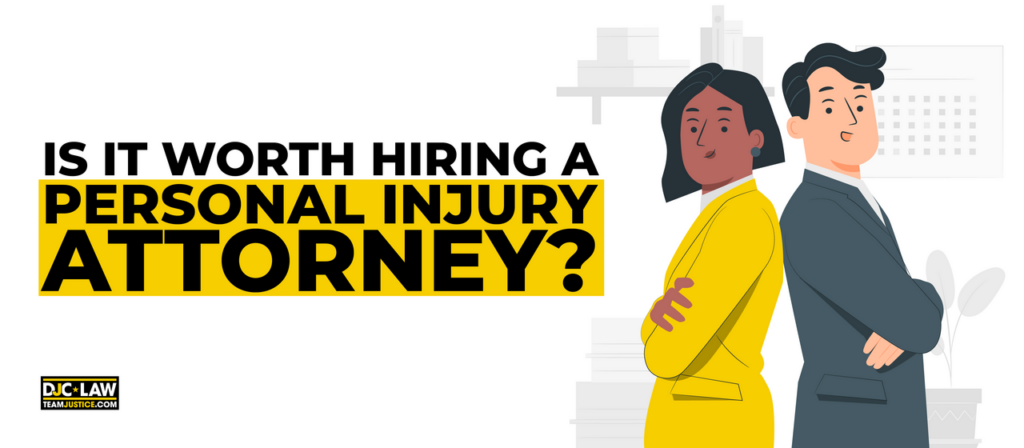
Hiring a personal injury attorney is a route you might not think you need to go down. If you’ve only suffered minor injuries or think your insurance will help, what’s the point in hiring a lawyer?
It’s a fair question.
After all, you’re not expecting to see the inside of a courtroom, and you probably don’t want to have to pay for legal representation. Every year, the National Institutes of Health reported that 70 million Americans sustain nonfatal injuries [1]. You could avoid hiring a lawyer, but wouldn’t you rather not have the stress and get a bigger settlement?
Those are the two reasons, in a nutshell, why it’s always worth getting an attorney on your side. Let’s go deeper and answer the question, “Is it worth hiring a personal injury attorney?”
Key Takeaways
-
Hiring a personal injury lawyer is always essential if filing an accident lawsuit to increase your chances of success and maximize your settlement.
-
Lawyers charge between 33-40% of any successful settlement on average.
-
The average compensation award when hiring a lawyer is three to four times higher than if you fight your case without legal representation.
-
You should hire a personal injury lawyer if you’ve sustained significant injuries, taken time off work, the other party denies liability, or you’ve received an insufficient offer from your insurer.
-
Lawyers ensure you meet all legal deadlines, file your claim accurately, and provide peace of mind during a stressful process.
Do I Need a Personal Injury Lawyer?
All personal injury cases should be hired by an experienced personal injury attorney. Your insurance company, employer, or even the person who caused your injuries might discourage you from this, but that’s for a reason. None of the above have your best interests at heart, and they want to pay as little as possible. For specialized cases like medical malpractice, it’s crucial to consult with an Austin medical malpractice attorney.
Injuries are more common than you think, with the National Safety Council reporting that 63 million Americans sought medical treatment for an injury in 2022 [2]. In other words, you’ve got about a one in five chance every year to find yourself injured and looking for a doctor.
You shouldn’t have to pay out of your own pocket for those medical bills, days off work, or emotional distress. That’s where your lawyer excels because they get you the proper settlement due. Your chances of actually doing this yourself are minuscule.
Can a Personal Injury Lawyer Actually Help Me?

Attorneys specializing in personal injury understand the law, statutes of limitations, and what your accident is worth in dollar value. They also know all the dirty tricks insurers and other parties employ to lower your settlement or even avoid paying you anything.
Lawyers understand that you’re not an expert in the law, so they explain everything you must know about the process and settlement you might be looking at. Likewise, they take control over your case, ensuring that you don’t have to lift a finger.
If you’re recovering from an injury, do you want the extra burden of trying to manage a personal injury claim as well? Most people would say absolutely not, but that’s the reality of trying to go it alone.
On the other hand, some people say they don’t want to lose a substantial part of their settlement because they have to pay a lawyer. It’s a valid point because as All Law reports, fees range from 33% to 40% in personal injury cases [3].
Despite this being a relatively large number, there are two points to mention:
-
You don’t pay a cent unless you win. That means if your lawyer fails to secure any compensation, then they work for free.
-
Lawyers are almost guaranteed to win you a substantially higher sum.
Let’s focus on that second point.
The legal encyclopedia Nolo reported that those who hire a lawyer receive, on average, more than four times as much in compensation than those who try to fight their own cases [4]. And these figures are after attorney fees are taken into account. In other words, a lawyer isn’t a luxury expense for those who don’t want the stress but an investment.
When Should You Consider Hiring a Personal Injury Attorney?
The best time to hire a personal injury attorney is immediately after the accident. That’s because the memories are still fresh, and it’s easier to gather evidence to pursue your case. Plus, your state may have a short statute of limitations.
For example, the Illinois General Assembly outlines that personal injury victims have two years from the date of the accident to file their case [5]. Leave it too long, and you’re entitled to nothing, regardless of your injuries. It’s two years in Illinois, but some states may give you as many as four years.
Either way, the best time to hire a lawyer is as soon as you can pick up the phone. However, there are some circumstances where you should always hire an attorney. Let’s go through them.
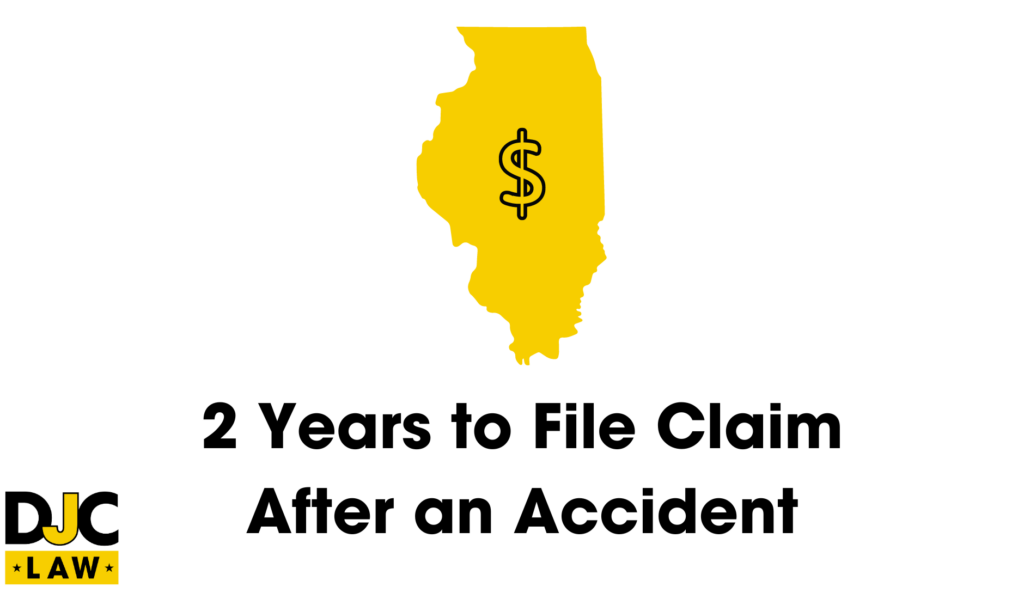
You Have Suffered Serious Injuries
Personal injuries resulting in serious injuries should necessitate a consultation with a lawyer. Some cases may result in life-long injuries, such as skull disfigurements or loss of a limb. Cases involving serious injuries are infinitely more complicated, and you’ll need a lawyer to prove damages and negligence.
Some of the aspects beyond negligence a lawyer will have to address when determining damages include:
-
Current medical expenses
-
Future medical expenses
-
Chronic pain and suffering
-
Lost wages
-
Loss of quality of life
-
Long-term trauma
In more serious personal injury cases, your decision to hire an attorney or not could amount to millions of dollars.
You’ve Lost Wages
Loss of wages is one of the most devastating losses resulting from injuries. Immediate loss of income, such as if you have to take six months off work, could cripple your family. Likewise, if you cannot return to work, it could amount to decades of lost wages and lost earnings potential.
If your injuries prevent you from returning to your usual role, you have a case for loss of income. Attorneys don’t make estimates. Instead, they’ll evaluate every lost workday, every shift, and what you’ve lost because your long-term ability to work and advance has been damaged.
The Responsible Party Denies Liability
Not admitting liability adds another barrier to obtaining fair compensation because all claimants must prove that the other party was negligent. Proving liability requires gathering evidence and carefully evaluating it to prove that the other party was at fault. Lawyers specialize in overcoming a denial of liability to ensure that you’re entitled to compensation.
For example, let’s say that you broke both your legs as a pedestrian because a motorcyclist ran a red light. It’s down to you to prove that the motorcyclist was responsible for your injuries and losses. This includes looking at:
-
Medical records
-
Police reports
-
Camera footage
-
Eyewitness reports
Skilled attorneys know how to obtain this evidence, what to search for within that evidence, and how to put everything together to prove the motorcyclist was at fault. You might know it was their fault, but that doesn’t mean you have the skill to prove it.
The Insurance Company Offers Insufficient Compensation
Insurance companies, including your own insurance company, are notorious for producing lowball offers to take advantage of your lack of knowledge and desperation. Insurance adjusters want to pay as little as possible, meaning they’ll attempt to minimize your injuries or try to get you to admit it was your fault partially.
Your insurer isn’t your friend, and they hire teams of adjusters whose sole role is to minimize how much they pay out to their clients. Lawyers understand these strategies and have the counter to stop them from succeeding.
Personal injury attorneys ensure that your insurer pays what you’re due and even file separate personal injury claims if your insurer doesn’t cover the full extent of your damages. The problem is that only with a lawyer will you even know if what your insurer is offering is sufficient.
What are the Advantages of Hiring a Personal Injury Attorney?
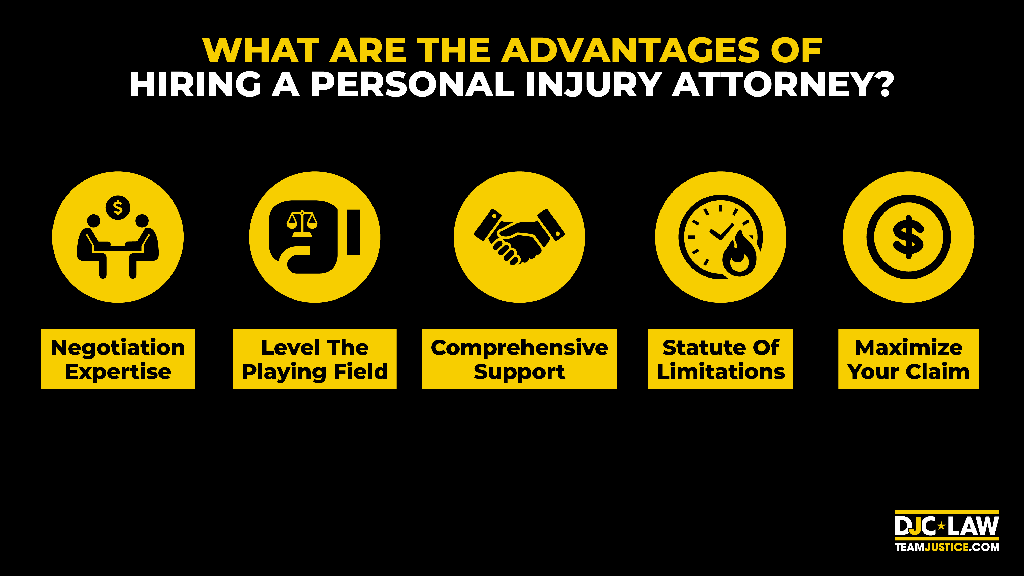
Hiring a personal injury enables you to negotiate harder, build a support system around you, and meet all legal deadlines. Additionally, attorneys give you the highest chance of recovering a larger settlement and winning your case.
Courts have jammed with personal injury cases. For example, Lawyer Monthly reported that personal injury filings surged by 97% in 2020, illustrating how an increase in awareness is encouraging people to assert their rights to compensation [6].
Still on the fence about hiring a lawyer for your personal injury case? Here are three advantages of “lawyering up.”
Negotiation With Insurance Companies
Your toughest challenge in any personal injury case is usually the insurance carrier. It’s their job to do everything possible to either get out of a payout or to minimize it. Insurance companies will use everything from the words you say to the content of your Facebook profile to do it – and most people aren’t prepared for this.
Legal representatives know how to negotiate with insurance carriers and any at-fault party. They don’t just ensure that you’re paid but that you’re paid at the right time to aid in getting your life back together.
Remember, insurance carriers have infinite resources in terms of money and manpower. A strategy as simple as constant delay can drain you so much that you’ll accept a lower settlement just to keep your head above water. Hiring a lawyer evens the playing field to optimize your compensation.
Solid Support System
Building out your support system is critical after sustaining an injury. Many personal injury law firms also have medical professionals as part of their staff to point you in the right direction, evaluate your claim, and serve as expert witnesses.
Working with a reputable personal injury law firm provides a support system that gives you the best care for your injuries, the best legal representation, and the best investigators to construct your case.
Access to these experts doesn’t just give you peace of mind during an emotionally taxing part of your life but also strengthens your claim. That’s why there’s such a disparity between what claimants with lawyers receive and what those without lawyers get.
Meeting the Statute of Limitations Deadline
Most states have a personal injury statute of limitations ranging from two to four years. If you fail to lodge your claim during your state’s time limit, you lose your right to claim compensation.
However, there are exceptions to these rules, especially when it comes to product liability and medical malpractice claims.
For example, a medical malpractice claim may have a statute of limitations of two years, but instead of two years from the day you received care, it’s two years from when you should have discovered your injuries. Naturally, there’s an enormous amount of interpretation involved here, which is why medical malpractice lawsuits are so complicated and contentious.
Your legal team goes the extra mile to ensure you meet whatever deadline is in place and to pursue your claim if there are extenuating circumstances, meaning you couldn’t file on time.
Why Legal Representation is Essential Most of the Time
Legal representation is always worth it because you’ll get more compensation, increase your chances of success, and give yourself peace of mind.
Furthermore, consulting a lawyer is a no-risk activity. Practically every law firm offers a free initial consultation where an expert will evaluate your case and decide whether you have a reasonable chance of success. You lose nothing by picking up the phone and bringing your case to an experienced attorney.
We don’t consider hiring a lawyer a luxury reserved for the wealthy but an essential, so here’s why legal representation should be a non-negotiable if you’ve been injured.
Extensive Legal Expertise
The law is complex, with thousands of loopholes for experienced operators to exploit and get out of paying a fair settlement. All insurance carriers have vast legal teams. No matter how smart you are, you can’t go up against an experienced legal professional with knowledge acquired from Google.
Personal injury lawyers provide objective legal expertise and experience garnered through thousands of personal injury and tort cases. It’s this legal guidance that allows them to answer questions like:
-
Does my situation qualify for a valid claim?
-
What are my chances of success?
-
Who can I make a claim against?
-
How long do I have to make this claim?
-
What do I need to show to win my case?
-
What damages am I entitled to?
You could spend thousands of hours researching the law and still be at a massive disadvantage when coming up against the opposition’s legal team. Surprisingly, it’s a mistake many make, with the National Law Review finding that 77% of Americans with a legal issue in 2018 did not seek legal counsel [7].
Don’t make that same mistake because it could cost you the maximum compensation amount.
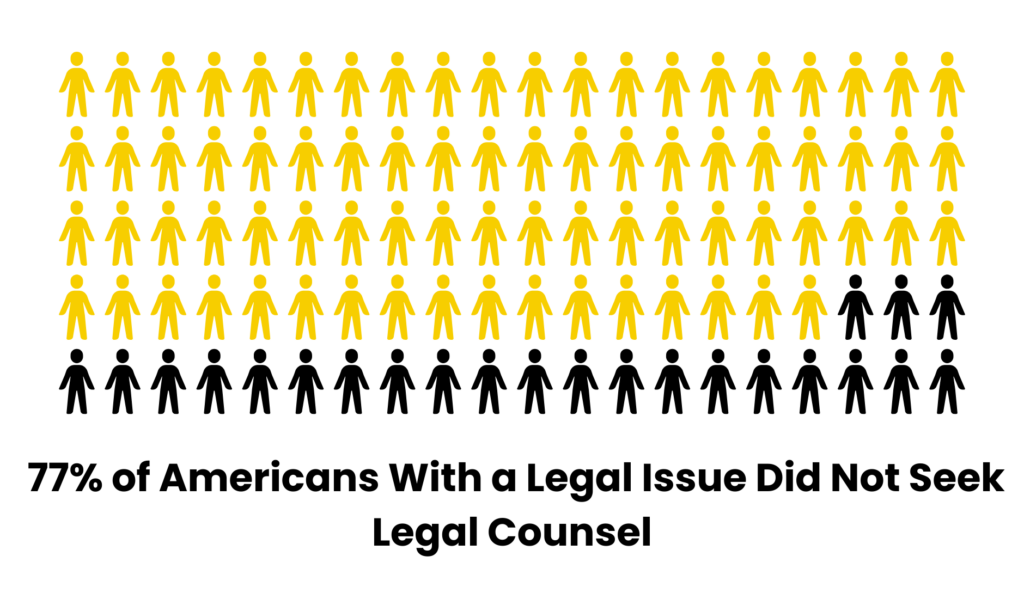
Maximizing Compensation
Your lawyer could win you a settlement that’s three to four times higher than what you’d get if you filed your own claim. These are not estimates but facts garnered through studying thousands and thousands of cases.
Not hiring a lawyer because you don’t want to pay the contingency fee of up to 40% is a classic example of a false economy. In other words, you’re saving money in the short term, but you’re costing yourself even more in the long run.
Lawyers do this by not only exploring every avenue of loss but also stopping you from making mistakes.
For example, one of the most common tactics an insurance adjuster might use is to contact accident victims quickly and request that you provide permission to access your medical information. It’s not to process your claim but to find loopholes to minimize your settlement.
Your lawyer puts a halt to this type of behavior to avoid you going into your claim at a disadvantage from the start.
Accurate Filing of Claims
Filing a claim requires a mountain of paperwork and several different deadlines. A single mistake can cause your claim to be delayed. Moreover, these forms typically use complex legal language and come with various exclusions. Again, these documents are usually far beyond the understanding of the average person.
Experienced personal injury lawyers file claims daily and know how to handle these forms correctly, preventing mistakes and ensuring your case stays on track.
Thorough Investigation of the Case
Proving negligence determines whether you are entitled to compensation at all. You must obtain hard evidence from various sources to prove negligence and the true extent of your injuries.
In cases where blame is shared, you must also provide evidence to prove that X% of the blame should go to the other party. It matters because if you’re found to be 30% to blame, you’ll lose 30% of any settlement.
In Illinois, the Illinois Department of Insurance uses modified comparative negligence laws [8]. These laws state that if you’re found to be 50% or more to blame for an accident, you’re not entitled to any compensation in a car accident.
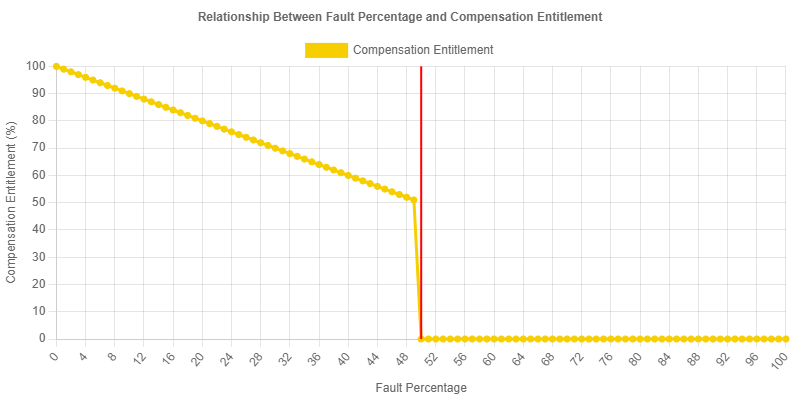
Your lawyer takes charge of the evidence-gathering process, which includes eyewitness testimony, expert witnesses, official reports, medical bills, and physical evidence from the scene.
More evidence means more compensation whether you’ve been involved in a slip and fall accident or a car accident.
Peace of Mind Throughout the Legal Process
All legal cases are stressful and emotionally taxing. Heap the stress onto the trauma of recovering from your injuries, and it’s easy to see why some people accept lower settlements just to get the claims process over and done with.
According to Broker World Magazine, 85% of individuals have experienced a legal event in the last three years [9]. Most people aren’t mentally strong enough to handle the process when trying to get their lives back on track, which is why proper legal representation is so valuable.
With an attorney, you know that you’re not in this alone. Your lawyer can support you in getting the help and reassurance you need to see your claim through to the very end. Ultimately, they have your best interests at heart because they want to maximize your settlement as much as you do.
When Is It Not Necessary to Hire a Personal Injury Attorney?

Not every incident requires a personal injury attorney. Minor injuries, limited losses, and if the math doesn’t make sense are all reasons why you may not want to hire a personal injury attorney. However, every situation is different, so it’s always worth taking advantage of free case consultations if you’re unsure.
Some of the top reasons not to hire a lawyer include:
-
Nobody Was Hurt – Most damages from personal injury claims result from the medical side of things. If you went to a medical facility and there were no injuries, it makes little sense to try to file a claim as the value just isn’t there.
-
You Went to Work – Another substantiative part of personal injury settlements is lost income. If you went back to work with no problems the following morning, you probably don’t have enough losses to make a claim.
-
Your Insurer Made a Fair Offer – Occasionally, minor accidents might result in a fair settlement offer from the insurance company. If they’ve covered your medical bills in full plus any property damage, you already have your losses covered, so there’s nothing more to claim.
-
The Math Doesn’t Make Sense – Approach a lawyer for a free case consultation, and they’ll tell you what they believe your claim could be worth. As a rule, if your contingency fee is one-third of your predicted settlement, you should only proceed if the results will improve by at least 50%.
-
It Was Your Fault – Personal injury claims only lead to a settlement if you can prove that the other party was at fault. If you were the guilty party, you don’t need to hire a lawyer.
However, most accidents aren’t that clear-cut. That’s why many people are unsure about hiring a lawyer. It’s usually free to ask for an opinion from a law firm, and they’ll provide you with an objective assessment of whether it’s worth hiring a lawyer to file a lawsuit.
What Percentage Do Most Personal Injury Lawyers Take?
Personal injury lawyers don’t charge upfront fees to accept your case. Instead, they charge what’s known as a “contingency fee,” which is 33-40% of the final settlement award.
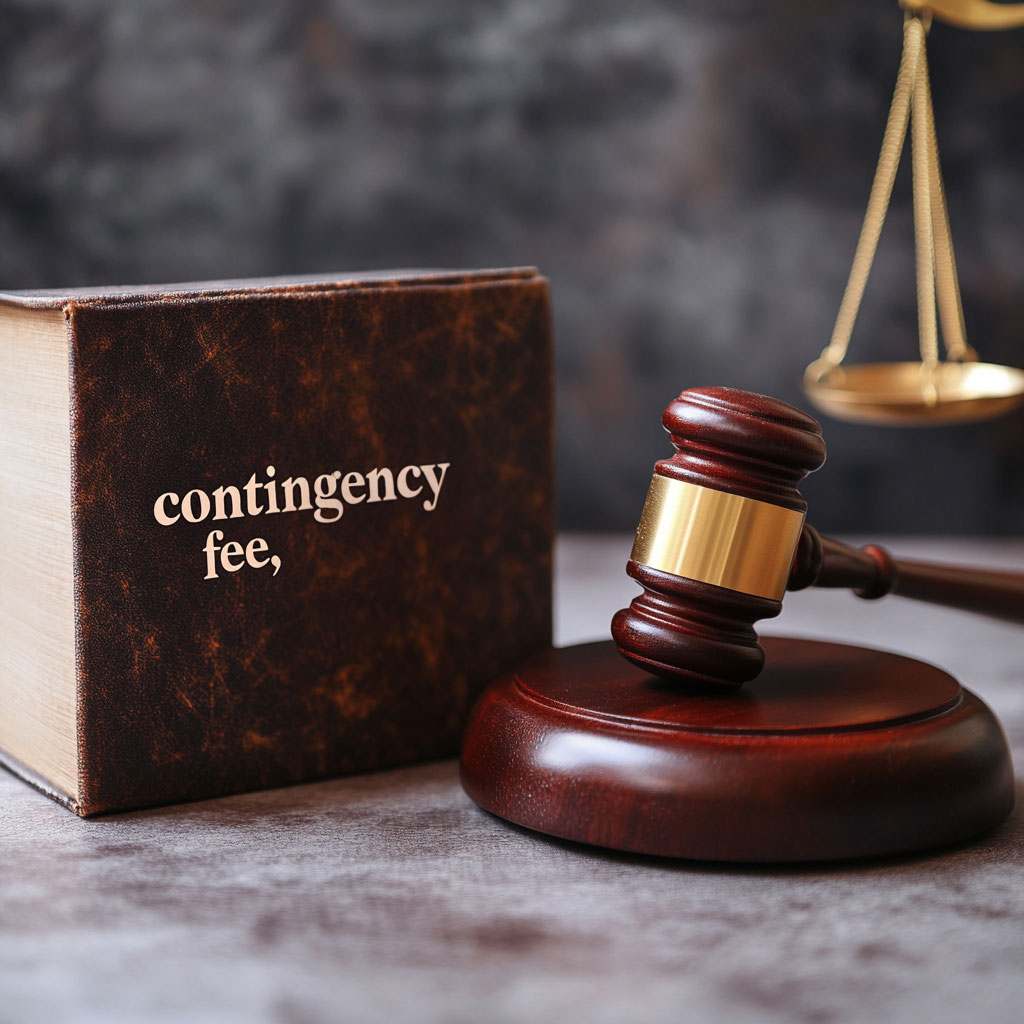
Although this may seem like a large percentage of your settlement to give away, it’s offset by the fact a lawyer could obtain triple or quadruple what you’d get if fighting your own case. That’s why hiring a lawyer isn’t an expense but an investment that nearly always delivers a positive return.
FAQs About Hiring a Personal Injury Attorney
How much do personal injury attorneys charge?
Personal injury attorneys charge 33-40% of the final settlement amount on average. You’ll never pay a dollar upfront to get legal representation, meaning you can obtain legal help regardless of income.
An attorney will evaluate your case and then decide if they want to take it on. If they don’t win an award, they work for free, making it a risk-free endeavor.
What criteria should be considered when selecting an attorney?
Selecting an attorney is challenging if you’ve suffered injuries because most towns have an array of law firms to choose from. Generally, we would advise prioritizing years of experience, track record, reputation in the community, their process, and the level of support they’ll provide you while fighting your case.
The contingency fee matters, but it’s seldom a good idea to decide based on cost alone. Trading a few percentage points could be a false economy that costs you more in terms of a lower final settlement.
How long does a personal injury lawsuit typically take?
It’s impossible to say because every personal injury case differs. Simple cases where liability is clear and there’s a relatively low amount involved could be resolved in just a few weeks. More complex cases where liability is disputed, and there are millions of dollars at stake could take a few years.
Talk to your lawyer, and they’ll be able to give you an unbiased estimate based on the specifics of your case.
What are the chances of winning a personal injury case?
Most personal injury cases usually end in an award. According to a Forbes report, 90-95% of cases end in a settlement because it’s not in the interests of either party to spend the time and resources on going to court [10].
In this sense, you’ve got around a 90% chance of obtaining some form of settlement. Of those remaining cases that go to court, CasePacer estimates that 50-60% of cases are eventually won by claimants [11].
1. https://www.ncbi.nlm.nih.gov/books/NBK217483/
2. https://injuryfacts.nsc.org/all-injuries/overview/
3. https://www.alllaw.com/articles/nolo/personal-injury/lawyers-fees.html
8. https://idoi.illinois.gov/consumers/consumerinsurance/comparative-negligence.html
9. https://brokerworldmag.com/the-stress-that-stems-from-legal-issues/
10. https://www.forbes.com/advisor/legal/personal-injury/personal-injury-settlement-amounts/
11. https://casepacer.com/resources/chances-of-winning-a-personal-injury-lawsuit



